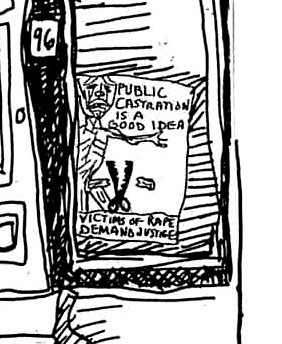Kagan was speaking at UCLA law school on Thursday night, and she spoke with experience about the problem of an 8-Justice Court's vulnerability to 4-4 splits, since that is the situation her Court confronted for the year that passed between the death of Antonin Scalia and the swearing-in of Neil Gorsuch.
"None of us wanted to look as if the court couldn’t do its job," she said. "I think we all felt as though the country needed to feel that the court was a functioning institution no matter what was happening outside."...
She said justices engaged in lengthier discussions at the time and even worked on finding agreement on smaller points when they couldn’t settle the larger issues at stake.... Even with a full court, Kagan said consensus-building, “especially perhaps in a time of acrimony and partisanship in the country at large, makes a lot of sense.”
“The court’s strength as an institution in American governance depends on people believe in it having a certain legitimacy ... that it is not simply an extension of politics,” she said.
I read that to mean that it's more important to sustain belief in a myth than to see the actual truth. The myth is that the Supreme Court is "not simply an extension of politics." I note that she phrases the myth at a more easily credible level than what some people would like us to believe — such as the Court is completely above all politics. That is, after all, the myth that prevails at confirmation hearings, where the nominees all say that they will do nothing but decide cases according to the law and no political leanings will come into play and distort their entirely legal reasoning. Kagan only says that the Court decides cases in a way that is "not simply an extension of politics."
Not "simply," but how about
complexly? Not merely "an extension" of the politics, but isn't it, as it operates
independently, doing something that a sophisticated person will understand to be political?
It's strange to be talking about the importance of useful beliefs over truth in the context of the controversy Kagan ostensibly seeks to avoid. What are the other institutions whose strength depends on our believing that they have a certain legitimacy?
The Senate. Should we believe in its legitimacy to keep it strong? That's not the Kagan idea. To transplant her idea to the Senate: The Senate
itself should do what it can to inspire our belief it is performing its advise-and-consent role grounded in good procedure and principle. It is struggling to do that, and the struggle is much easier to see than the inner workings of the Supreme Court.
The patriarchy. Is it good for us to believe that it is legitimate? Just calling it —
what is it?! — "the patriarchy" makes it sound illegitimate. I bet you — some of you — want to say it doesn't even exist. But if it does exist in America, it wants us to believe in it as something with a different name — perhaps
meritocracy or
individual choice. Believe in that, and you'll keep it strong.
The #MeToo movement. Its strength as an institution depends on people believing in it as having quite a lot of legitimacy. It's fragile. Overuse it and it will collapse. Won't it? If not, we should be afraid of its strength. But unlike the Supreme Court, it's not a small group of people who can consult and reach consensus about how far to extend its power and how to perform its power in public. There are millions of people who can tap the power of the movement. There's the relatively careful release of the Christine Blasey Ford allegations, and there's the follow on enthusiasm of Michael Avenatti and who knows who might suddenly speak up on social media?






















